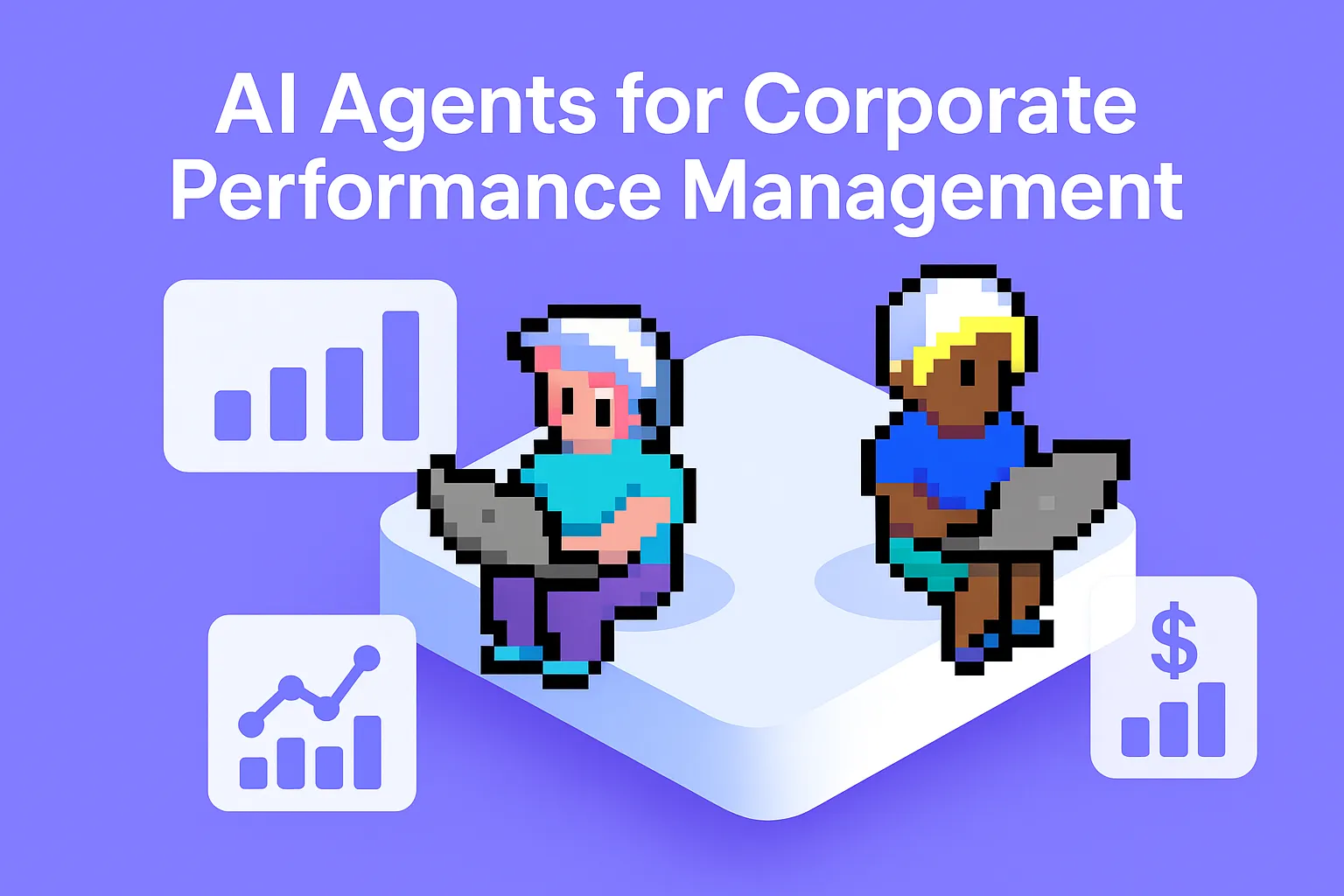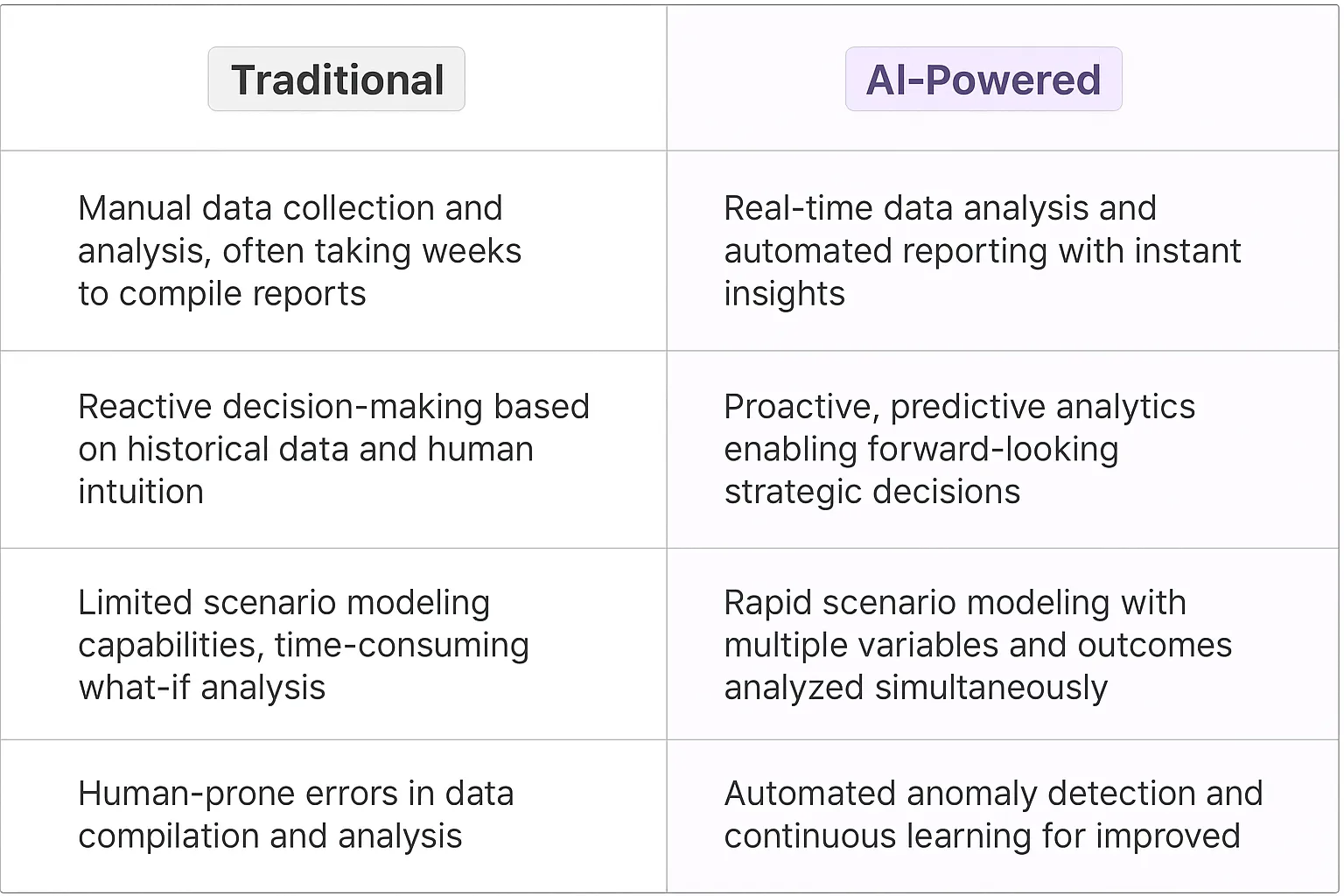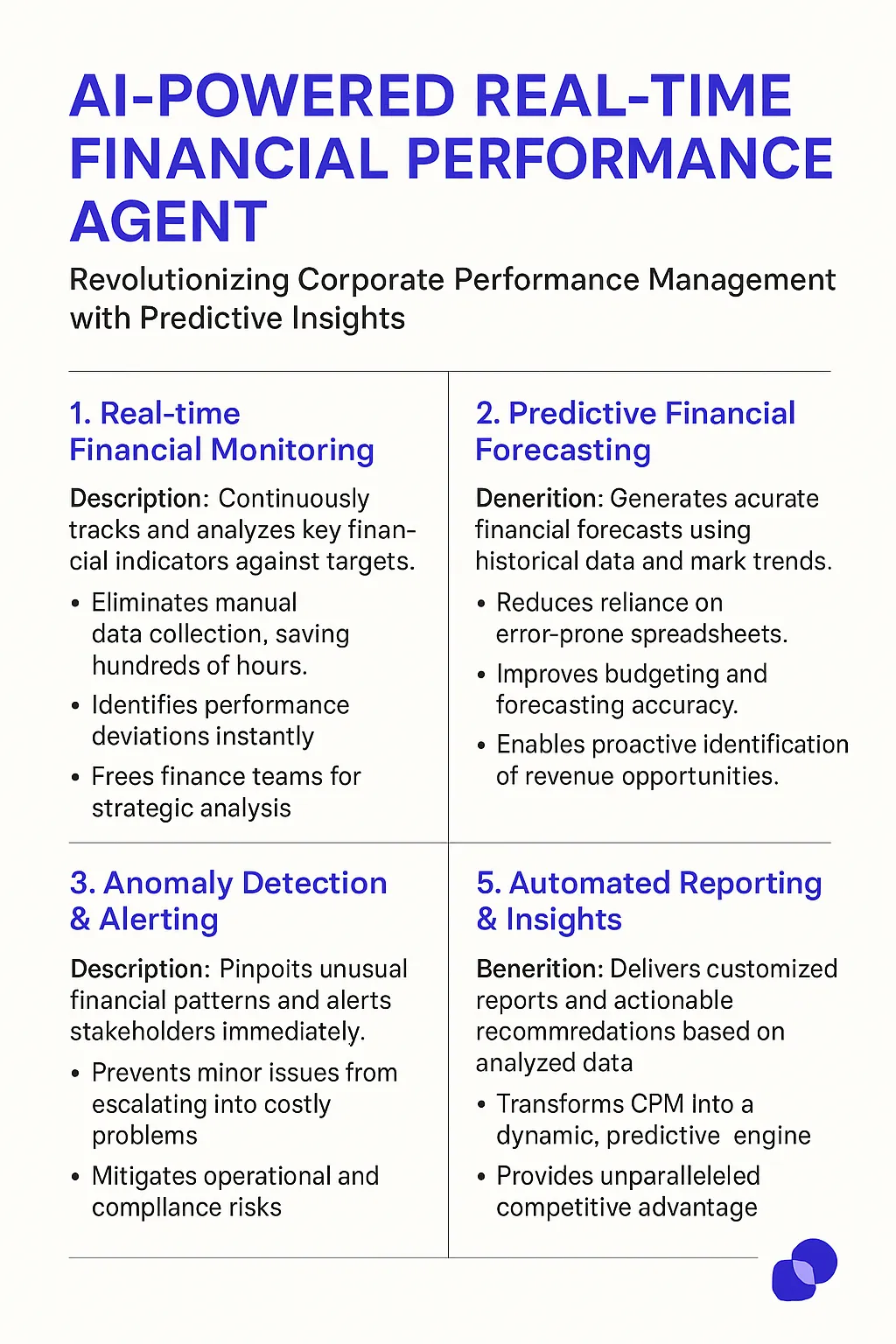Corporate Performance Management AI Agents
The Evolution of Corporate Performance Management with AI Agents
Corporate Performance Management is a comprehensive approach to aligning an organization's strategies, goals, and operations with its financial and operational results. It encompasses processes like budgeting, forecasting, financial reporting, and strategic planning. Traditionally, CPM relied heavily on manual data collection, analysis, and reporting, often resulting in delayed insights and reactive decision-making.
The integration of AI agents has supercharged CPM with several key features:1. Real-time data analysis and reporting2. Predictive analytics for forecasting and risk assessment3. Automated anomaly detection and alert systems4. Advanced scenario modeling capabilities5. Personalized insights tailored to different stakeholders6. Continuous learning and improvement of performance modelsThese features enable businesses to shift from retrospective analysis to proactive, data-driven decision-making, giving them a significant competitive edge in today's fast-paced business environment.

Benefits of AI Agents for Corporate Performance Management
What would have been used before AI Agents?
Before AI agents entered the scene, corporate performance management was a labyrinth of spreadsheets, manual data entry, and endless meetings. Finance teams would spend countless hours gathering data from various departments, reconciling discrepancies, and creating reports that were often outdated by the time they reached decision-makers. It was like trying to navigate a ship using last week's weather forecast – possible, but far from optimal.
The traditional approach relied heavily on human intuition and experience, which, while valuable, couldn't keep pace with the increasing complexity and speed of modern business environments. Companies were essentially flying blind, making critical decisions based on incomplete or outdated information.
What are the benefits of AI Agents?
Enter AI agents for corporate performance management – they're like having a team of tireless, data-crunching savants working 24/7 to optimize your business performance. These digital teammates are transforming the landscape in several key ways:
- Real-time insights: AI agents continuously monitor and analyze data streams, providing up-to-the-minute insights. This allows companies to pivot quickly in response to market changes or emerging opportunities. It's like having a financial crystal ball that's always on.
- Predictive analytics: By leveraging machine learning algorithms, AI agents can forecast future trends and outcomes with uncanny accuracy. This predictive power enables proactive decision-making, helping companies stay ahead of the curve rather than constantly playing catch-up.
- Automated reporting: Say goodbye to mind-numbing manual report generation. AI agents can automatically compile, analyze, and present data in easily digestible formats. This not only saves time but also reduces the risk of human error, ensuring that decision-makers have access to reliable information. Automated reporting systems can handle complex scheduling and distribution tasks.
- Anomaly detection: These digital teammates excel at spotting patterns and irregularities that might escape human notice. They can flag potential issues or opportunities early, allowing companies to address problems before they escalate or capitalize on hidden opportunities. Advanced anomaly detection capabilities can identify subtle deviations in performance metrics.
- Scenario modeling: AI agents can rapidly run multiple "what-if" scenarios, helping companies evaluate potential strategies and their likely outcomes. This capability turns strategic planning from a guessing game into a data-driven process.
- Personalized insights: Different stakeholders need different types of information. AI agents can tailor reports and insights to individual users, ensuring that everyone from the CFO to department managers gets the most relevant information for their role.
The integration of AI agents into corporate performance management is like upgrading from a compass to GPS navigation. It's not just an incremental improvement; it's a fundamental shift in how companies understand and steer their financial performance. As these technologies continue to evolve, we're likely to see even more sophisticated applications that will further widen the gap between AI-powered companies and those still relying on traditional methods.

Potential Use Cases of AI Agents with Corporate Performance Management
Processes
AI agents are poised to transform corporate performance management in ways we're only beginning to grasp. These digital teammates can dive deep into financial data, surfacing insights that might take human analysts weeks to uncover. They're not just number crunchers; they're pattern recognizers operating at superhuman speed.
One key process where AI agents shine is in forecasting. Traditional methods often fall short, relying too heavily on historical data and human intuition. AI agents, on the other hand, can ingest vast amounts of internal and external data, from sales figures to economic indicators, and generate more accurate, nuanced predictions. They're constantly learning, refining their models with each new data point.
Another critical process is risk assessment. AI agents can continuously monitor key performance indicators, flagging potential issues before they become full-blown crises. They're tireless sentinels, always on guard against financial irregularities or market shifts that could impact corporate performance.
Tasks
When it comes to specific tasks, AI agents are game-changers in corporate performance management. Take budget allocation, for instance. These digital teammates can analyze past performance, current market conditions, and strategic goals to suggest optimal resource distribution across departments. They're not replacing human decision-makers, but they're providing a level of data-driven insight that was previously unattainable.
Performance reporting is another task where AI agents excel. They can automatically generate comprehensive reports, pulling data from multiple sources and presenting it in easily digestible formats. But they go beyond mere data aggregation. These agents can identify trends, anomalies, and correlations that might escape human notice, adding a layer of analysis that elevates the entire reporting process.
Perhaps most exciting is the potential for AI agents in scenario planning. They can rapidly model countless "what-if" scenarios, helping executives understand the potential impacts of various decisions or market changes. This capability turns corporate performance management from a reactive discipline into a proactive, strategic tool.
The integration of AI agents into corporate performance management isn't just an incremental improvement - it's a paradigm shift. We're moving from a world of quarterly reviews and annual forecasts to one of real-time insights and continuous optimization. Companies that embrace this shift will find themselves with a significant competitive advantage, able to navigate market uncertainties with unprecedented agility and foresight.
But let's be clear: AI agents aren't a magic bullet. They're powerful tools that require skilled operators. The companies that will truly benefit are those that invest not just in the technology, but in developing the human expertise to leverage it effectively. The future of corporate performance management lies in this symbiosis between human strategic thinking and AI-powered analysis.

Industry Use Cases: AI Agents in Corporate Performance Management
AI agents are reshaping Corporate Performance Management (CPM) across industries, offering tailored solutions that go beyond traditional metrics. These digital teammates aren't just crunching numbers; they're providing insights that can pivot entire business strategies. Let's dive into some industry-specific scenarios where AI is transforming CPM:
In retail, AI agents are parsing through mountains of sales data, customer feedback, and market trends to forecast demand with uncanny accuracy. They're not just telling you what sold well last quarter; they're predicting the next big seller before it hits the shelves.
For financial services, these AI powerhouses are revolutionizing risk assessment and compliance. They're scanning global markets, regulatory changes, and internal data to flag potential issues before they become costly problems. It's like having a team of eagle-eyed analysts working 24/7, but without the coffee breaks.
In manufacturing, AI agents are optimizing supply chains and production schedules in real-time. They're factoring in everything from raw material prices to energy costs, ensuring that every product is made at the right time for maximum profitability.
These are just a few examples of how AI is elevating CPM from a retrospective tool to a predictive powerhouse. The real magic happens when these digital teammates start connecting dots that humans might miss, unlocking new avenues for growth and efficiency.
Retail's AI-Driven Performance Revolution
Let's talk about how Corporate Performance Management (CPM) AI agents are reshaping the retail landscape. It's not just about crunching numbers anymore; we're entering an era where AI becomes the secret weapon for retail giants and scrappy startups alike.
Picture a major retail chain - let's call them MegaMart. They're drowning in data: sales figures, inventory levels, customer feedback, and more. Traditionally, teams of analysts would spend weeks compiling reports, often delivering insights that were already outdated. Enter CPM AI agents.
These digital teammates are constantly ingesting and analyzing data in real-time. They're not just spitting out reports; they're proactively flagging issues and opportunities. For instance, the AI might notice a sudden spike in returns for a particular product line. It doesn't just report this; it correlates it with customer reviews, social media sentiment, and even weather patterns. Within hours, not weeks, MegaMart's management has actionable insights to address the issue.
But it gets better. These AI agents are learning and evolving. They start to predict trends before they happen. They might notice subtle shifts in purchasing patterns that human analysts would miss, allowing MegaMart to adjust inventory and marketing strategies proactively. This isn't just incremental improvement; it's a fundamental shift in how retail operations are managed.
The real game-changer? Personalization at scale. CPM AI agents can analyze individual customer behaviors and preferences, enabling MegaMart to tailor its offerings and communications to each shopper. We're talking about millions of micro-decisions made in real-time, optimizing everything from product placement to pricing strategies.
This isn't some far-off future. It's happening now, and it's separating the winners from the losers in retail. The companies that embrace these AI-driven CPM systems aren't just improving their bottom line; they're redefining what's possible in retail performance management.
As we've seen time and again in tech, the early adopters who lean into these transformative technologies often end up dominating their industries. In retail, CPM AI agents are quickly becoming the difference between thriving and merely surviving. It's a classic example of software eating the world - and in this case, it's taking a big bite out of traditional retail management practices.
Manufacturing's AI-Powered Performance Leap
The manufacturing sector is on the cusp of a seismic shift, and Corporate Performance Management (CPM) AI agents are the catalysts. This isn't your grandfather's factory floor - we're talking about a new paradigm where AI becomes the backbone of operational excellence.
Take a company like TechFab, a mid-sized manufacturer of electronic components. They're competing in a cutthroat market where margins are razor-thin and efficiency is everything. Traditional performance management tools just don't cut it anymore. That's where CPM AI agents come in, and they're not just incremental improvements - they're game-changers.
These digital teammates are constantly monitoring every aspect of TechFab's operations. They're ingesting data from IoT sensors on the production line, analyzing quality control metrics, and even factoring in global supply chain disruptions. But here's the kicker: they're not just reporting. They're predicting, optimizing, and sometimes even making decisions autonomously.
For instance, the AI might detect a subtle variation in raw material quality that human operators would miss. It doesn't just flag the issue; it automatically adjusts machine settings to compensate, maintaining output quality without human intervention. This level of real-time, adaptive management is unprecedented in manufacturing.
But it goes deeper. These AI agents are learning and evolving. They're starting to understand the intricate dance of supply and demand at a granular level. They might notice that a particular component sells better when bundled with specific other parts, or that demand spikes for certain products correlate with events in seemingly unrelated industries. This isn't just data analysis; it's pattern recognition at a superhuman level.
The result? TechFab isn't just improving its efficiency; it's fundamentally changing how it operates. The company can now offer mass customization at near-mass production prices. They can predict and prevent maintenance issues before they occur, virtually eliminating unplanned downtime. And they can optimize their supply chain in real-time, adapting to global disruptions with an agility that was previously unthinkable.
This AI-driven approach to manufacturing performance isn't just a nice-to-have; it's rapidly becoming a must-have. The companies that embrace these technologies aren't just shaving a few percentage points off their costs; they're redefining what's possible in manufacturing efficiency and agility.
As we've seen in other industries, the early adopters of transformative technologies often end up dominating their sectors. In manufacturing, CPM AI agents are quickly becoming the differentiator between market leaders and also-rans. It's a classic example of how software is eating the world - and in this case, it's taking a big bite out of traditional manufacturing practices.
Considerations
Technical Challenges
Implementing a Corporate Performance Management AI Agent isn't a walk in the park. It's more like trying to teach a robot to dance salsa while juggling flaming torches. The technical hurdles are real, and they're not for the faint of heart.
First up, data integration. Your AI agent needs to feast on data from across the organization - financial systems, HR databases, CRM platforms, you name it. But here's the kicker: these systems often speak different languages. It's like trying to host a dinner party where every guest speaks a different dialect. Your AI needs to be the ultimate polyglot, seamlessly translating and integrating this babel of data.
Then there's the machine learning model itself. Training an AI to understand the nuances of corporate performance is like teaching a computer to appreciate fine wine. It needs to grasp complex financial metrics, understand industry trends, and even pick up on the subtle interplay of human factors. This isn't your garden-variety image recognition task - it's next-level stuff that pushes the boundaries of current AI capabilities.
And let's not forget about scalability. As your company grows, your AI needs to keep pace. It's not enough to build a system that works today; you need to architect a solution that can handle 10x, 100x, or even 1000x the current load without breaking a sweat. This requires some serious forward-thinking in terms of infrastructure and algorithm design.
Operational Challenges
On the operational front, implementing a Corporate Performance Management AI Agent is like trying to change the engine of a car while it's still running. You can't just hit pause on your business operations while you get this new system up and running.
One of the biggest hurdles is change management. You're not just introducing a new tool; you're potentially reshaping how your entire organization thinks about and manages performance. This is where the rubber meets the road. You need to get buy-in from the C-suite down to the front-line managers. And trust me, there will be resistance. People don't like change, especially when it comes with a side of AI that might make them feel obsolete.
Then there's the question of governance. Who's in charge of this AI? Who decides what metrics it tracks, what recommendations it makes? You need to establish clear lines of responsibility and accountability. Otherwise, you risk creating a digital black box that no one fully understands or trusts.
Data privacy and security are also major concerns. Your AI is going to be handling some of your company's most sensitive information. You need ironclad security measures and clear data handling policies. One breach could not only compromise your competitive advantage but also land you in hot water with regulators.
Lastly, there's the ongoing maintenance and evolution of the system. AI isn't a set-it-and-forget-it solution. It needs constant fine-tuning, regular updates, and occasional overhauls as your business evolves and new technologies emerge. You're signing up for a long-term commitment here, not a one-night stand.
Implementing a Corporate Performance Management AI Agent is a complex undertaking, but get it right, and you're looking at a potential game-changer for your organization. Just remember, the devil is in the details - and there are a lot of details to wrestle with.
Embracing AI-Powered Corporate Performance Management: A Game-Changing Strategy
The integration of AI agents into Corporate Performance Management marks a paradigm shift in how businesses understand and optimize their performance. These digital teammates are not just enhancing existing processes; they're redefining what's possible in areas like forecasting, risk assessment, and strategic planning. From retail to manufacturing, AI-powered CPM is separating market leaders from the pack, offering unprecedented levels of insight and agility.However, implementing these systems comes with significant technical and operational challenges. Data integration, model training, scalability, change management, and ongoing maintenance are just a few of the hurdles businesses must overcome. Despite these challenges, the potential benefits are too substantial to ignore. As AI technology continues to evolve, we can expect even more sophisticated applications that will further widen the gap between AI-powered companies and those still relying on traditional methods.The future of Corporate Performance Management is here, and it's powered by AI. Companies that successfully navigate the implementation challenges and fully leverage these digital teammates will find themselves not just surviving, but thriving in an increasingly complex and competitive business landscape. The question is no longer whether to adopt AI in CPM, but how quickly and effectively you can make it a core part of your performance management strategy.













